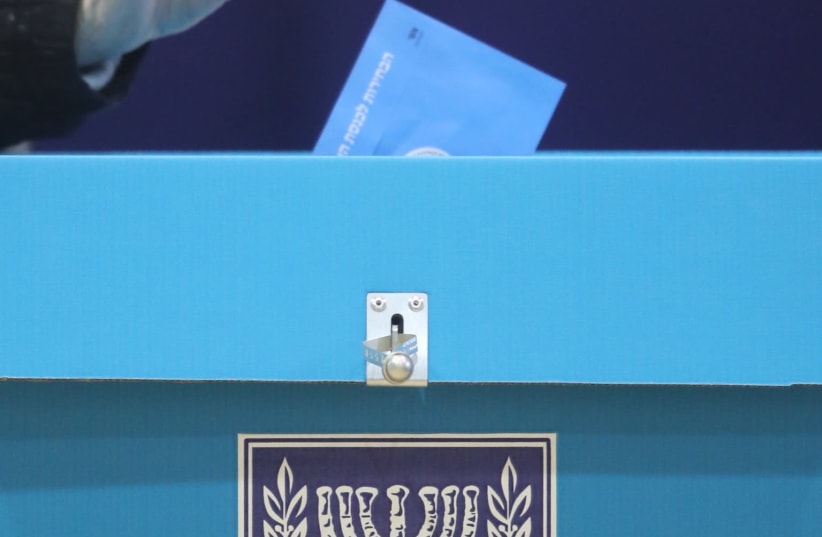The 23rd Knesset elections were plagued with voter fraud and other misdemeanors, from parties attempting to “buy” votes to fake news being disseminated that turned voters away.
The Shas Party was fined NIS 7,500 by the Central Elections Committee (CEC) for handing out amulets promising to protect the bearer from the coronavirus. Each amulet had an image of the late Shas spiritual leader Rabbi Ovadia Yosef and came inside a card holder saying, “Protection against plague: Corona – and all evils,” with a sentence from the biblical incident in which Pinchas stopped the outbreak of a plague amongst the Israelites.
Shas Party activists at its election stands were witnessed offering these amulets to voters, as well as giving out Shabbat candles also bearing Yosef’s picture and the Shas logo.
A 10-page petition was filed to the CEC by Labor-Gesher-Meretz earlier on Monday when party activists witnessed the distribution of the items in Herzliya.
The petition, clearly prepared ahead of time in the expectation that Shas would continue with its practice of distributing amulets on Election Day, pointed out that the ultra-Orthodox party had carried out similar activities in the April and September 2019 elections, and had been fined by the committee on those occasions as well.
CEC chairman Neal Hendel accepted the Labor-Gesher-Meretz petition, and said Shas did indeed violate the law that the distribution of “election propaganda shall not be connected to the giving of gifts.”
Hendel ruled that the fact that the amulets did not bear the logo or name of Shas was irrelevant since the distribution of any amulets in connection with an election is forbidden, and instructed the ultra-Orthodox party to immediately desist from the practice.
The Shas Party said in response that it would respect the ruling, but said that it was “further proof that Meretz, which pretends to be open and ‘liberal,’ is trying to force its lifestyle on a large traditional and religious public that believes in the power of prayer and talismans against evil injuries and disease.”
But Meretz itself was also targeted, complaining on Monday of a “flood” of reports about attempts to harm the Labor-Gesher-Meretz camp and “steal ways of voting in certain areas.” This included the party reporting that a Likud activist offered a voter in Tel Aviv NIS 1,000 if she would vote for the Likud Party.
“Also today on Election Day, and every day after it, we will fight on behalf Israeli citizens for Israeli democracy,” said Labor-Gesher-Meretz in response to the decision.
Blue and White filed a complaint to the CEC after “fake news” was “intensively” published about the party, including an edited video of party leader Benny Gantz in which he is shown calling on his supporters not to vote for Blue and White.
On Monday evening, Hendel ordered Prime Minister Benjamin Netanyahu to remove the video from his Facebook page. Netanyahu and the Likud Party were also ordered to pay Blue and White a NIS 7,500 fine.
“The time has come for Netanyahu to pay for his lies and his spreading of poison. We must move forward,” the party said in response to the fake news.
The Likud Party allegedly offered to bring voters in Eilat to voting booths in limousines, and was ordered to stop doing so by the CEC.
Yisrael Beytenu filed multiple complaints about irregularities at voting booths throughout Israel, including a woman in Petah Tikva who was unable to vote because someone had illegally voted in her name and a woman in Ashkelon who had the same issue. Some 54 voters in Kiryat Bialik complained that Yisrael Beytenu notes were glued to each other at their voting booth. In Ashdod, Shas representatives allegedly threw Yisrael Beytenu notes in the trash.
Fake letters arrived in several polling stations across Israel on Monday, claiming that Otzma Yehudit had dropped out of the election race. These letters were allegedly signed by CEC director-general Orly Ades.
“Never happened,” the committee announced. “Otzma Yehudit never quit the race.”
After complaints about voting slips that were intentionally damaged or were not produced correctly, Hendel announced on Monday evening that the CEC would count notes with holes, dirt or drawings in pen on either side, in a way that they was obviously damaged in order to disqualify them. Slips that are missing words or letters, were otherwise printed incorrectly or were cut in an incorrect way will be counted as well. Notes with the correct letters, but the wrong full name of the party will also be counted, according to the letters. If there’s only one such slip found at an entire voting booth, however, it will not be counted.
A similar decision to count slips that would normally be disqualified was also made during the September elections.
By press time, there were rumors of reports that certain voting stations were shut down for periods of time due to fraud and other threats.
Voter fraud is common in Israeli elections. In the previous election in September, a committee was formed to investigate the election integrity following multiple complaints. The committee examined “several cases of suspicions,” but determined that they ultimately they did not impact the final election results.
